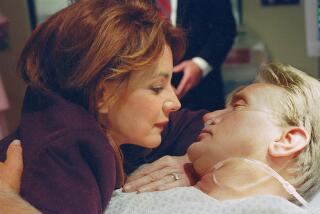L.A. Confidential
- Share via
How relentlessly time passes and how exotic the years, steam-rollered by its passage, look in retrospect: Mossad rubs out evil Nazis; the mob and the CIA plan hits on Castro; FBI agents drink in public while puffing on their pipes; a gun for hire chain smokes Chesterfields; and everyone inhales in cinemas where ashtrays beckon smokers from the back of facing seats. But then it’s 1960, and the country appears chock-full of guineas, faggots, fruits, pansies, queers, niggers, broads, reds and other equally noxious pejoratives now mercifully abandoned. If yids are not rudely featured in “The Shot,” it is because by then they’ve joined the ruling classes. Even a Mafia boss calls himself Gold when visiting Florida, “because Miami is a Jew town, and a Jew name gets you the proper respect.”
In 1960, that’s true beyond Miami. Jews work for the FBI or pay to elect handsome Jack Kennedy president of the United States--despite the fact that the promiscuous pol has been laid, we’re told, more times than a dinner table--because no one wants a bum like Ike’s VP, Richard Nixon, running the country.
Incredible that all this should pass only two score years ago, further away than most care to remember; except that Philip Kerr, who is young and English, has a great time being irreverent, impertinent, dredging up our past sins and floating shock balloons to prick the current conformities of his readers.
Here’s this professional shootist, clearly the best there is, hired to puncture Fidel Castro so that Cuba shall once again float on gambling and daiquiris, who turns around and begins to plan how to rub out our own president-elect. A twist that will take us from Palm Beach to Washington and New York, from Havana to Harvard Yard, and from one surprise to the next while everyone except the mob, (which conscientiously delivered the Democrats), plays false, betrays, deceives, pursues or pussy hunts and wise participants reflect that, if a God there be, he’s not the kind who looks after his friends.
Kerr on the other hand looks after readers embarked on his switchback ride. Castro, whose long-winded speeches bore Cubans into submission, will not be snuffed. Nor will the promiscuous president-to-be. The shootist walks. There’s always another time. I hope there’s another Kerr soon too. Like it or not, this thriller really thrills.
Meanwhile back on the range, that is in T. Jefferson Parker’s Orange County not far from the Coast Highway, a call girl, Aubrey Whittaker, is murdered. She’s 19, beautiful and thriving at her trade. She leaves behind a notebook full of coded johns and a wealth of physical evidence that will inspire the sleuths but also confuse issues and point at trails that will peter out. The investigators out of the sheriff’s office, Merci Rayburn and her partner, Paul Zamorra, carry loads of psychological baggage; but they feel, or at least Merci feels strongly, that when people die who aren’t supposed to die, the assholes who have done it should not go free.
Easy to say, hard to carry out. The freeways are in chaos because pouring rain plays hell with traffic, the sheriff’s office is awash in politics, private lives impinge on public duties and so does the unsolved case of another prostitute murdered in 1969, which Merci finds has a great deal to do with Whitaker’s death and unrequited sins.
As old guilts fester and contaminate, forensic detail is churned out by the bushel and psychiatric interludes punctuate the account. But office politics, lab work and procedure (often bent) scarcely affect the pace or the convolutions of a yarn that revels in complications and catches at your throat the further it spins on. The blurb calls T. Jefferson Parker a thinking man’s bestseller, and “Red Light” puts one in mind of Sherlock Holmes: When you’ve eliminated the impossible, whatever’s left, however improbable, must be the truth. Yet mystery is a genre designed to encourage thinking men, and thinking women too, to suspend cerebration along with disbelief. Parker pulls that off brilliantly; and I for one enjoyed the license not to think.
George V. Higgins, who died when he was scarcely 60, does not make that easy. A respected professional, he had published 29 novels of suspense (the first in 1972 was “The Friends of Eddie Coyle”) in which he dissected criminous moves and minds, mapping thorny malefaction in its intricacies, with special flair for the exotic dialects of Boston and its surroundings. “At End of Day,” his 30th production, is worse than a disappointment: a tedious bore full of recitatives, deprived of melodies, in which prattle crowds out action. All that Higgins’ hoodlums do is talk, talk, talk and that, as you well know, made Jack a dull boy. That goes for Higgins’ latest: his last and least.
More to Read
Sign up for our Book Club newsletter
Get the latest news, events and more from the Los Angeles Times Book Club, and help us get L.A. reading and talking.
You may occasionally receive promotional content from the Los Angeles Times.







